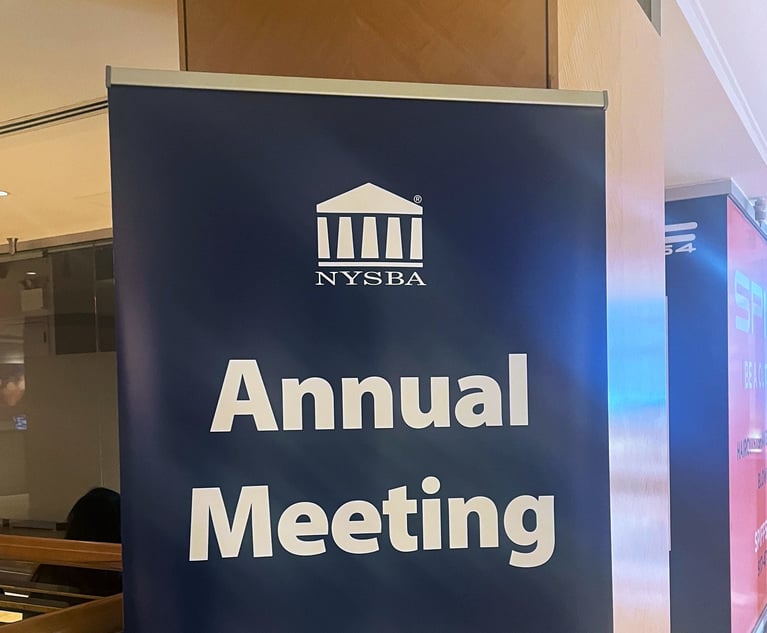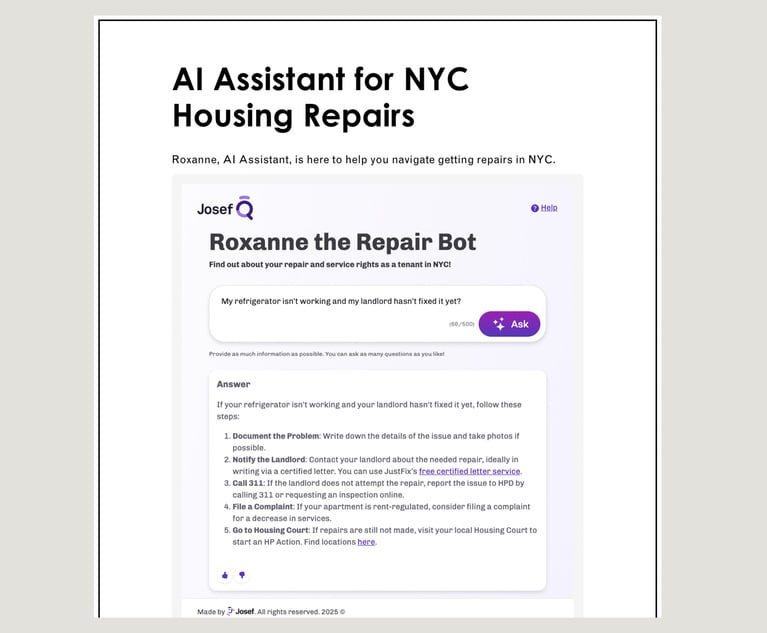 Still from the webinar "Navigating the AI Revolution," hosted in July by New York Law School and Cimplifi. Credit: YouTube
Still from the webinar "Navigating the AI Revolution," hosted in July by New York Law School and Cimplifi. Credit: YouTube Navigating AI in Legal Practice: A Road Map for In-House Counsel
Deploying Gen AI in these use cases need not raise the prospect of a threat to legal jobs, two contributors explained in a recent webinar. Instead, it's a means to improve efficiencies and to allow lawyers to focus their energies on priorities rather than routine matters.
August 27, 2024 at 03:25 PM
6 minute read
In today's fast-paced technological landscape, generative artificial intelligence is transforming various sectors, including the legal field. Even for experienced in-house lawyers, the prospect of integrating this technology into the work of a legal department can be daunting. But the promise is real. This road map seeks to assist in-house counsel by setting out a baseline checklist to get this work started.
Gen AI's Use Cases in Legal Departments
To start, separate out two categories of use cases.
- Generic Use Cases: These involve using large language models (i.e., AI tools that draw from vast datasets) to answer questions or generate content based on their training data. For example, asking ChatGPT for information on a legal development or using a Gen AI tool to fill out a research task.
- Grounded Use Cases: These involve grounding the Gen AI in specific documents or datasets, enabling it to provide answers based on proprietary information.
Then there are a number of specific use cases that ought to assist in-house lawyers in carrying out their work.
- Brainstorming: Gen AI can help overcome the "blank page syndrome" by generating initial drafts or ideas.
- Authoring: It can create content from its training data or specific documents provided by the user, which in-house lawyers can then build off of with their own written work.
- Interrogating Documents: Gen AI can extract answers from legal memos or documents, improving efficiency.
- Summarization and Translation: Gen AI can summarize large documents or translate text accurately.
- Legal Research: Gen AI can add research capabilities by grounding their models in extensive legal databases.
Efficiency Gains and the Human Element
Deploying Gen AI in these use cases need not raise the prospect of a threat to legal jobs. Instead, it's a means to improve efficiencies and to allow lawyers to focus their energies on priorities rather than routine matters. This improvement justifies investments in Gen AI technology. But the human element will always remain critical. And Gen AI may very well create new job opportunities for those lawyers versed in technologies in such areas as risk management, ethics and AI governance.
NOT FOR REPRINT
© 2025 ALM Global, LLC, All Rights Reserved. Request academic re-use from www.copyright.com. All other uses, submit a request to [email protected]. For more information visit Asset & Logo Licensing.
You Might Like
View All
NYSBA Annual Meeting: How In-House Counsel Navigate Gen AI Risk

Josef Partners With NYU, Housing Court Answers to Launch AI Assistant Built for Tenants

Walking the AI Tightrope: Communicating Innovation Without Undermining Core Values
5 minute readTrending Stories
Who Got The Work
J. Brugh Lower of Gibbons has entered an appearance for industrial equipment supplier Devco Corporation in a pending trademark infringement lawsuit. The suit, accusing the defendant of selling knock-off Graco products, was filed Dec. 18 in New Jersey District Court by Rivkin Radler on behalf of Graco Inc. and Graco Minnesota. The case, assigned to U.S. District Judge Zahid N. Quraishi, is 3:24-cv-11294, Graco Inc. et al v. Devco Corporation.
Who Got The Work
Rebecca Maller-Stein and Kent A. Yalowitz of Arnold & Porter Kaye Scholer have entered their appearances for Hanaco Venture Capital and its executives, Lior Prosor and David Frankel, in a pending securities lawsuit. The action, filed on Dec. 24 in New York Southern District Court by Zell, Aron & Co. on behalf of Goldeneye Advisors, accuses the defendants of negligently and fraudulently managing the plaintiff's $1 million investment. The case, assigned to U.S. District Judge Vernon S. Broderick, is 1:24-cv-09918, Goldeneye Advisors, LLC v. Hanaco Venture Capital, Ltd. et al.
Who Got The Work
Attorneys from A&O Shearman has stepped in as defense counsel for Toronto-Dominion Bank and other defendants in a pending securities class action. The suit, filed Dec. 11 in New York Southern District Court by Bleichmar Fonti & Auld, accuses the defendants of concealing the bank's 'pervasive' deficiencies in regards to its compliance with the Bank Secrecy Act and the quality of its anti-money laundering controls. The case, assigned to U.S. District Judge Arun Subramanian, is 1:24-cv-09445, Gonzalez v. The Toronto-Dominion Bank et al.
Who Got The Work
Crown Castle International, a Pennsylvania company providing shared communications infrastructure, has turned to Luke D. Wolf of Gordon Rees Scully Mansukhani to fend off a pending breach-of-contract lawsuit. The court action, filed Nov. 25 in Michigan Eastern District Court by Hooper Hathaway PC on behalf of The Town Residences LLC, accuses Crown Castle of failing to transfer approximately $30,000 in utility payments from T-Mobile in breach of a roof-top lease and assignment agreement. The case, assigned to U.S. District Judge Susan K. Declercq, is 2:24-cv-13131, The Town Residences LLC v. T-Mobile US, Inc. et al.
Who Got The Work
Wilfred P. Coronato and Daniel M. Schwartz of McCarter & English have stepped in as defense counsel to Electrolux Home Products Inc. in a pending product liability lawsuit. The court action, filed Nov. 26 in New York Eastern District Court by Poulos Lopiccolo PC and Nagel Rice LLP on behalf of David Stern, alleges that the defendant's refrigerators’ drawers and shelving repeatedly break and fall apart within months after purchase. The case, assigned to U.S. District Judge Joan M. Azrack, is 2:24-cv-08204, Stern v. Electrolux Home Products, Inc.
Featured Firms
Law Offices of Gary Martin Hays & Associates, P.C.
(470) 294-1674
Law Offices of Mark E. Salomone
(857) 444-6468
Smith & Hassler
(713) 739-1250







